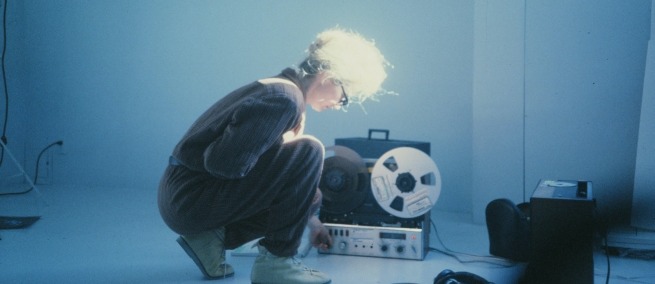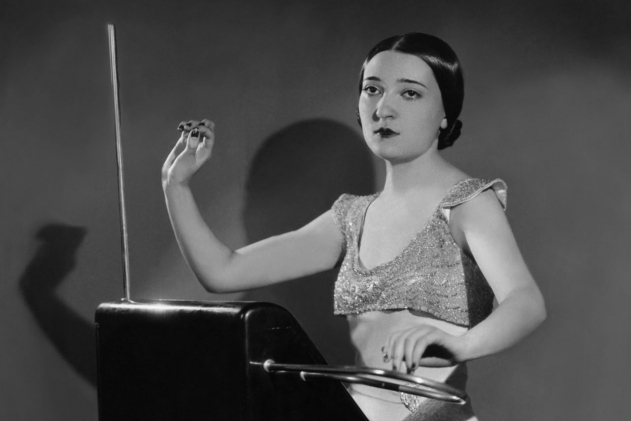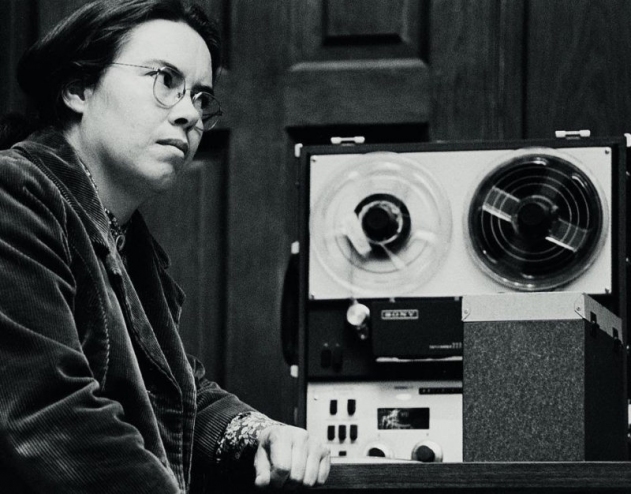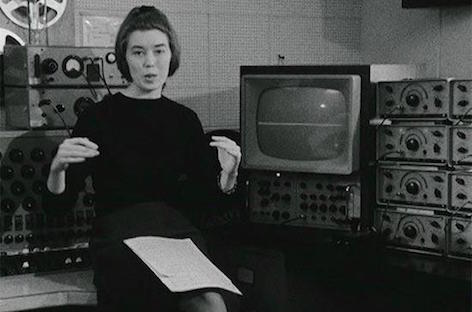
The new documentary SISTERS WITH TRANSISTORS interweaves rare archival footage to tell the story of many overlooked women pioneers of electronic music, including Clara Rockmore, Daphne Oram, Bebe Barron, Delia Derbyshire, Pauline Oliveros, Wendy Carlos, Éliane Radigue, Suzanne Ciani, and Laurie Spiegel. Narrated by Laurie Anderson, a central through line of the film is how liberating it was to work with technology for these composers. SISTERS WITH TRANSISTORS was an official selection at SXSW and CPH: DOX 2020, and will be screened in Sheffield as part of Sheffield Doc Fest in the fall with a concurrent online presentation. We spoke with director Lisa Rovner from her home in London about the film’s subjects and its release.
Science & Film: I found it really interesting that many of the subjects in your film talk about how electronic music was freeing from the conventions of classical music and also from the barriers to entry women face in the music industry. With technology they could do it all themselves. How did that central idea make its way into the film?
Lisa Rovner: The emancipation through technology is something I came across in my initial research and is what drew me to the subject, I think it’s one of the most fascinating aspects of electronic music and as a female filmmaker, I can totally relate!
I’m not particularly technological—I studied political science so I’m not coming at the story from a technological perspective, I was drawn to the subject because it had elements of all the things I’m most interested in: music, art, politics and feminism.
I’m crazy about music and knew of Pierre Schaeffer, Stockhausen, Musique Concrète, I knew they were manipulating found sound, but like most people, I didn’t really know what that meant. I also had no idea there were women figures in the early days of electronic music. I wanted to participate in the rewritting of an inclusive history by showing, rather than telling. I was thinking, how do I make a political film that’s engaging, entertaining, and doesn’t feel too dogmatic?
S&F: Perhaps particularly with archival films, because you conceive of so much before involving other people? Does that seem right?
LR: Yeah. I mean the research that went into this–I went into a rabbit hole for a few years and came out okay. I feel like the film really changed me. I hear the world differently now. I think about things in a very different way and I hope that’s what audiences will take away from it too.
The archival work was such a big job, I had no idea. I thought, it’ll be really cheap to make an archive film. Little did I know just how expensive archive is to license and how much work it takes to get good archival material to work with. To find the right stuff you really have to put a lot of time and energy into it.

Clara Rockmore
S&F: How did you decide which musicians to focus on?
LR: There were so many women making electronic music, it was impossible to include them all, ultimately the archive I uncovered decided for me. The archive drove the story. Some of the footage was on television, on BBC for example, and other footage I got from ex-partners of some of the women. Some of the photos and home movies of Pauline Oliveros, you’d never find those in a library. Then, I found material in random small archives scattered around the States and a bit of New Zealand.
It felt like investigative journalism at times. I hunted down archive [material] by contacting old lovers, a lead would lead me to another lead, I emailed people incessantly, found people to digitize out of date formats; it wasn’t easy but ultimately I enjoyed the process and loved meeting the people I got entangled with along the way.
S&F: It was incredible to see the scenes of Clara Rockmore playing the Theremin, partly because that instrument is so crazy to watch.
LR: I know. I couldn’t believe my eyes when I first that footage. I was completely enchanted by Clara’s every move. That footage of her dancing with her sisters in the 30s is so transporting. You immediately get a sense of who she was, I fell in love with her at first sight, who wouldn’t? It’s hard to imagine just how alien the Theremin must have been to audiences in the 30s, it still seems so magical, imagine back then!

Pauline Oliveros
S&F: How did you decide when to end the film?
LR: It ends with Laurie Speigel because she really pioneered the way everyone makes music these days. Her software Music Mouse transformed the Mac computer into a musical instrument. As Charles Amirkhanian says in the film, she was one of the first to make computer music that people would actually want to listen to. Of course, people are continuing to reinvent how we make music, Holly Herndon one of contributors is creating music with AI, which is pretty far out…
S&F: Do you have an audience in mind for the film?
LR: I guess someone like you, like me [laughs]—generally speaking, people who are interested in music and women’s stories. We just started our Instagram two weeks ago and it’s remarkable to feel the audience’s hunger for the film. They’re such incredible women,they deserve a large audience. It’s a story for our time but then it’s also timeless; this film is going to be just as important in ten years as it is now.

Delia Derbyshire
S&F: Have any of your subjects seen the film?
LR: I want them to see the film in a cinema with an audience around them, and with this COVID thing, that’s not happened yet. It’s such a weird time to be releasing a film into the world. I was literally uploading the film to SXSW–we’d booked our flight, our room, when I heard from my dad that Netflix had pulled out [of SXSW]. I was in such an edit bubble I had no concept of what was going on in the world. That same night, I was having have my first drink in weeks with friends celebrating the completion of my film when I got a text from my producer: “SXSW is cancelled.” I couldn’t believe it.
It’s such a bummer, but what can you do? In filmmaking you learn to roll with the punches. I can’t wait to share the film with audiences, I dream of doing so in cinemas, because this film is really meant for a cinema equipped with 5.1 sound.

Director Lisa Rovner
SISTERS WITH TRANSISTORS is directed by Lisa Rovner and produced by Anna Lena Vaney and Marcus Werner Hed. It is will make its world premiere at Sheffield Doc Fest in the fall. For updates on the film’s release, you can follow the film through social media platforms.
TOPICS